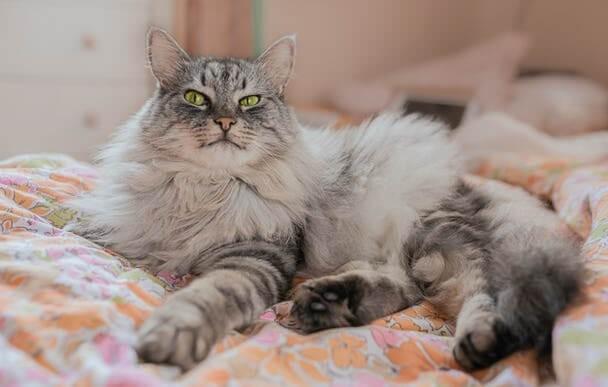It looks like you’ve caught your cat sniffing something intensely, then suddenly freezing, mouth wide open, like they just got hit with the world's strangest odor. Spoiler alert! Your cat hasn’t encountered the ghost of last night's tuna can; luckily, they are not even judging you for your choice of air freshener.
What you witnessed is called the "Flehmen response."
Just like dogs, cats also use their powerful sense of smell to explore the world around them. But unlike dogs, cats do not go nose-to-the-ground sniffing. They open their mouths into a strange sneering or grimacing expression.
We’ve explained the ‘flehmen response’ in detail below. But here’s why it exists in the first place. Mostly, male cats use this response to assess a female’s readiness to mate by sniffing her urine. Apart from them, however, any other cat can use this ‘superpower’ to inspect anything worth investigating. It could be dirty laundry, anal gland secretions, facial pheromones from other kitties, or a new intriguing smell. (3)
The reason we call this a superpower is that using this response, cats can actually “read” messages other cats have left behind, like if they’ve claimed a particular territory, and detect mates if they’re unspayed or unneutered. So, it is like a long-distance communication device for them. This even helps kitties absorb pheromones from their mother’s mammary glands, which makes them feel safe and calm. (3)
What is the Flehmen Response in Cats?
The ‘Flehmen Response’ is a behavioral response to external stimuli (mostly odors) that animals use to better evaluate the environment around them. It is a voluntary response, unlike involuntary ones like salivating in the presence of delicious food. (2)
This phenomenon in cats is seen when they curl up their upper lips, expose their front teeth, inhale with the nostrils usually closed, and then often hold this position for several seconds. This allows air to pass through their VMO or vomeronasal organ, which is an accessory olfactory organ at the base of the nasal cavity. The VMO processes the pheromones and hormones secreted by other animals as a sensation as a combination of taste and smell. (2)
Do Cats Have a Good Sense of Smell?
If you think you have a good sense of smell, cats have at least 14 times better sense of smell than us, humans. For them, it is a primary sense by which they explore and evaluate the world around them. On average, cats have around 200 million odor sensors or receptors in their noses (humans have 5 million). Some dogs may have more olfactory receptors than cats, but cats have a better ability to differentiate between similar scents. (4)
Why Does My Cat Lay on Me and Leave Her Mouth Open?
The first possible answer here again is the ‘flehmen response.’ Your cat must just be trying to smell something. The cat may also stick out its tongue to open its airways and investigate its surroundings. This happens through two small ducts on the roof of the cat's mouth that suck the scent.
But don’t overthink this. There is a chance that you’re wearing an old T-shirt with hot sauce spilt all over it. But there is a higher chance that your cat is not bothered by anything and is just engaging in natural behavior. The Flehmen response alone doesn’t usually indicate a specific emotional state. Your cat may just be relaxed like a human sleeping with the mouth open and snoring. (1)
Other possible reasons for your cat to leave the mouth open and sleep on you can be breathing problems or pulmonary edema. If a cat is breathing through its mouth for a prolonged period, it could be a sign of respiratory distress or feline asthma. And if your cat is also experiencing shortness of breath, a dry cough, congestion, lethargy, and loss of appetite, it could be because of an underlying severe medical condition like pulmonary edema.
More About Spot Pet Insurance
The ‘Flehmen response’ is natural in cats. But as we mentioned above, there could be a chance of your cat experiencing other symptoms that indicate the possibility of an underlying medical condition. Some may be minor, but others may need extensive treatment. The treatment may also require proper diagnostics including X-rays, blood tests, etc.
You probably were aware of these facts. But did you know that with pet health insurance, you can save up to 90% of the associated treatment costs?
With a Spot accident and illness plan, you can take your cat for treatment at any licensed vet in Canada or the U.S. Spot plans don’t have networks, so whether you’re home or traveling within the U.S, veterinary services your cat receives for the diagnosis, treatment, or management of eligible services can be covered. Spot’s accident and illness plans can help cover a variety of conditions, ranging from broken bones and bite wounds to behavioral conditions, and cancer. While base plans do not offer coverage for preventive care services, Spot’s Wellness Riders can be added to any base plan for an additional fee and can help cover the eligible costs of wellness exams, vaccinations, dental cleanings, and more!
Learn more about cat insurance or get a free quote!

I’m Charlie: canine enthusiast with a knack for figuring out why my dog, Dallas, is more infatuated with tennis balls than me. My lifelong passion for dogs has created a dedication to help other pet parents better understands their furry family members!
Tomis, V. (2024, May 27). Flehmen response in cats: Why they open their mouths to smell. The Dog People by Rover.com. https://www.rover.com/blog/cat-open-mouth-smell/
Wikipedia contributors. (2024, October 1). Flehmen response. Wikipedia. https://en.wikipedia.org/wiki/Flehmen_response












